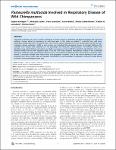Pasteurella multocida Involved in Respiratory Disease of Wild Chimpanzees
Köndgen, Sophie
Leider, Michaela
Lankester, Felix
Bethe, Astrid
Lübke-Becker, Antina
Leendertz, Fabian
Ewers, Christa
Pasteurella multocida can cause a variety of diseases in various species of mammals and birds throughout the world but nothing is known about its importance for wild great apes. In this study we isolated P. multocida from wild living, habituated chimpanzees from Taı¨ National Park, Coˆ te d’Ivoire. Isolates originated from two chimpanzees that died during a respiratory disease outbreak in 2004 as well as from one individual that developed chronic air-sacculitis following this outbreak. Four isolates were subjected to a full phenotypic and molecular characterisation. Two different clones were identified using pulsed field gel electrophoresis. Multi Locus Sequence Typing (MLST) enabled the identification of previous unknown alleles and two new sequence types, ST68 and ST69, were assigned. Phylogenetic analysis of the superoxide dismutase (sodA) gene and concatenated sequences from seven MLST-housekeeping genes showed close clustering within known P. multocida isolated from various hosts and geographic locations. Due to the clinical relevance of the strains described here, these results make an important contribution to our knowledge of pathogens involved in lethal disease outbreaks among endangered great apes.
No license information
Related Items
Show related Items with similar Title, Author, Creator or Subject.
-
2013-06-06ZeitschriftenartikelTravel-associated Legionnaires’ disease in Europe, 2010 Jong, B. de; Hallström, L. Payne; Robesyn, E.; Ursut, D.; Zucs, PhillipIn 2010, the European surveillance network for travel-associated Legionnaires’ disease (ELDSNet, previously EWGLINET) received reports of 864 cases of travel-associated Legionnaires’ disease, of whom 24 were reported to ...
-
2013-02-19ZeitschriftenartikelLymphogranuloma Venereum in Men Screened for Pharyngeal and Rectal Infection, Germany Haar, Karin; Dudareva-Vizule, Sandra; Wisplinghoff, Hilmar; Wisplinghoff, Fabian; Sailer, Andrea; Jansen, Klaus; Henrich, Birgit; Marcus, UlrichTo determine prevalence of lymphogranuloma venereum among men who have sex with men in Germany, we conducted a multicenter study during 2009–2010 and found high rates of rectal and pharyngeal infection in men positive for ...
-
2009-10-15ZeitschriftenartikelLow ankle-brachial index predicts cardiovascular risk after acute ischemic stroke or transient ischemic attack Busch, Markus; Lutz, Katrin; Röhl, Jens-Eric; Neuner, Bruno; Masuhr, FlorianBackground and purpose: A low ankle-brachial blood pressure index (ABI) is an established risk marker for cardiovascular disease and mortality in the general population, but little is known about its prognostic value in ...

